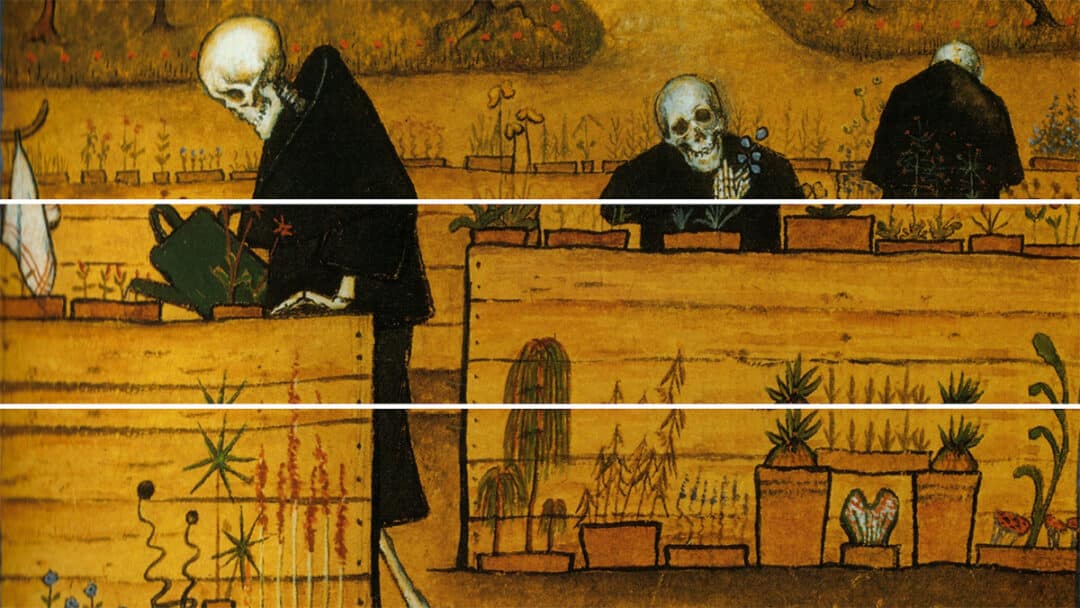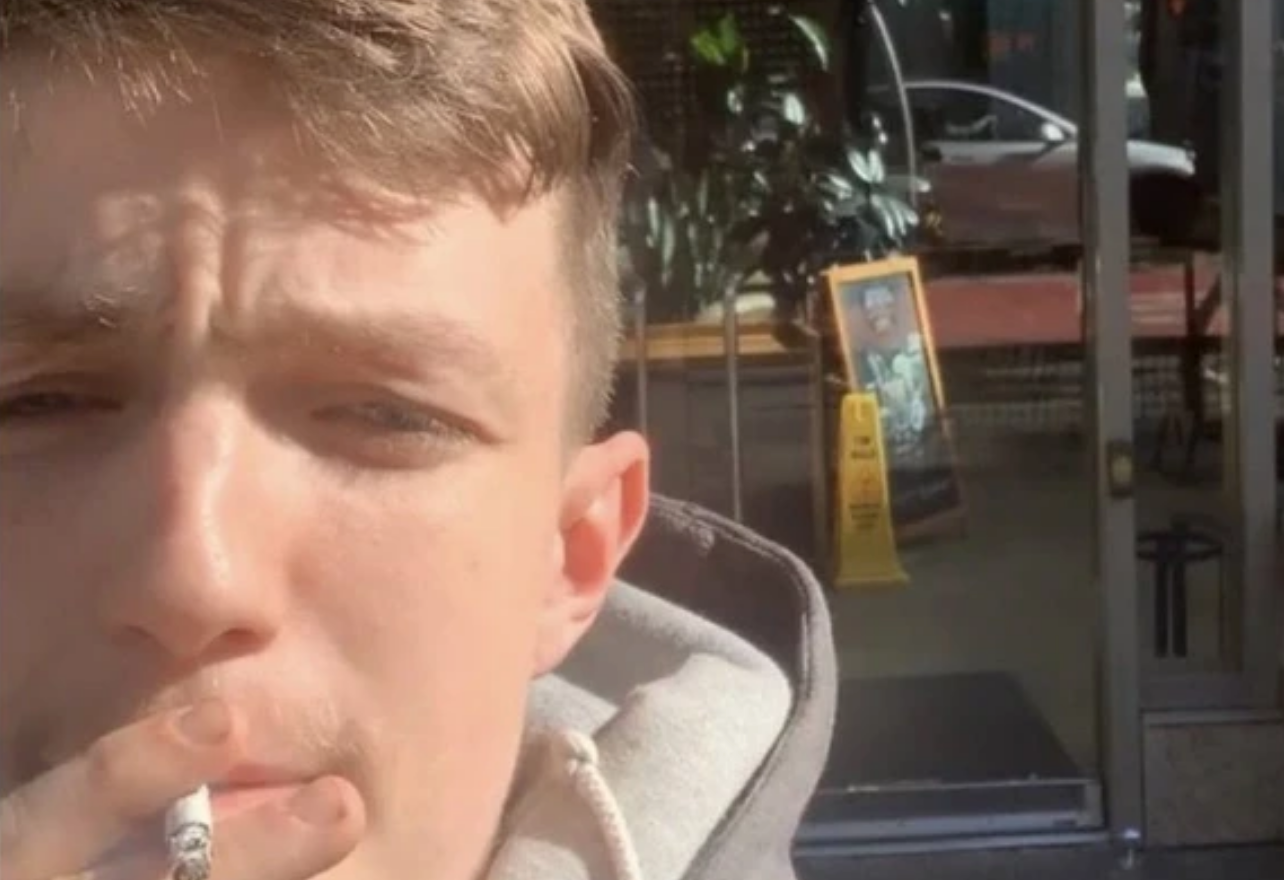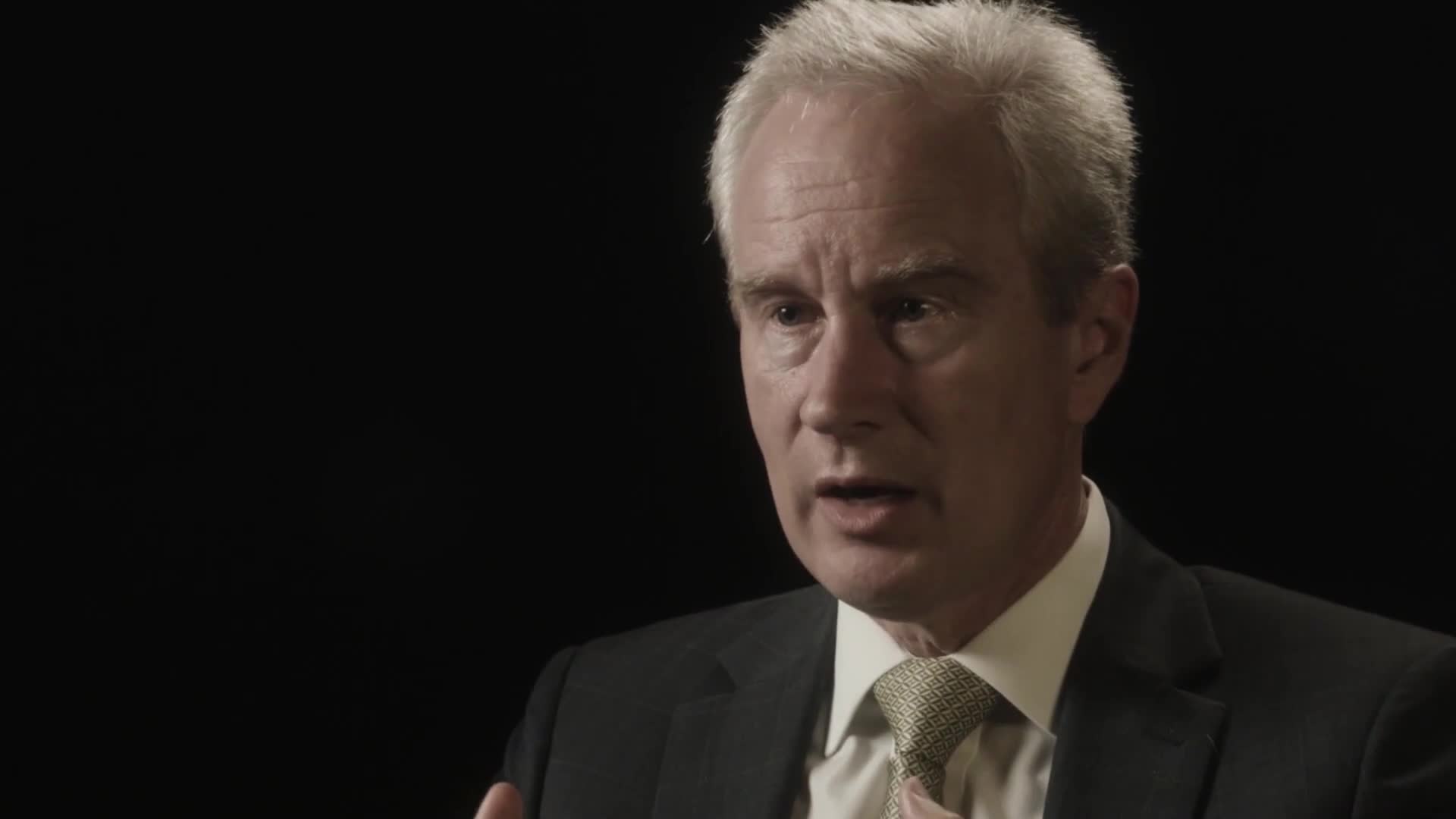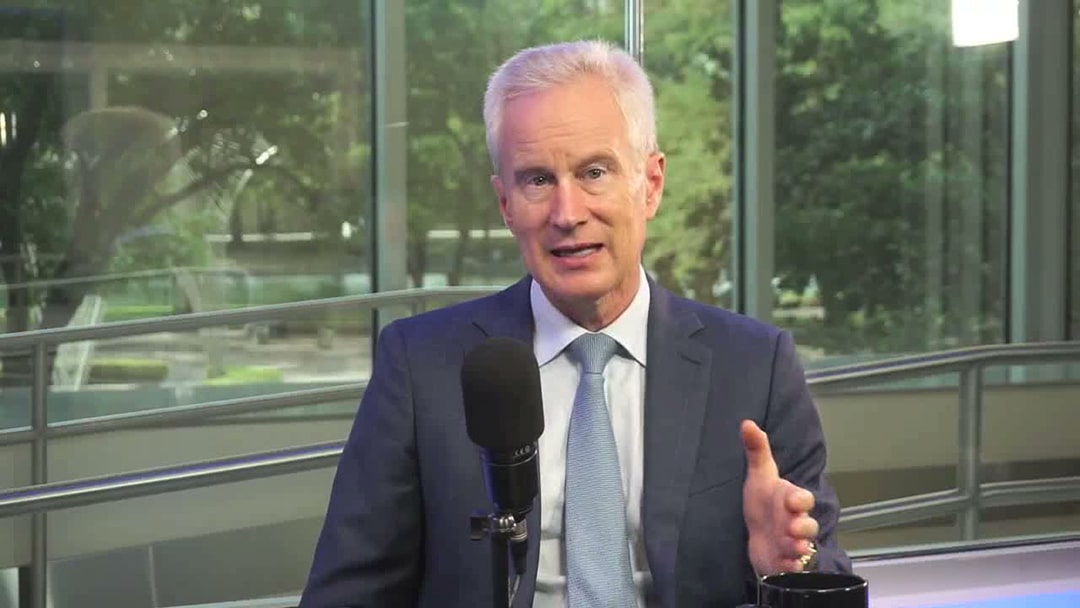

Hugo Simberg, ‘Garden of Death.’
New Normal Nihilism
by Rozali Telbis | May 8, 2023
On Sunday, March 19, 2023, a 37-year-old man was stabbed to death outside a Starbucks in downtown Vancouver as his wife and daughter looked on in horror. A TikToker by the name of Alex Bodger (who goes by Gora Pakora on TikTok) recorded the final moments of the victim’s life.
The incident itself was horrific for obvious reasons, but it laid bare more disturbing trends.
For one, Alex, the TikToker who stood by and recorded the stabbing later took a selfie next to the victim’s body, and even returned to the crime scene the day after to level up his social media game.

Alex taking selfies at the location of the stabbing the day after.
The guy who recorded the stabbing in Vancouver taking a selfie next to the victim body and then returning the next morning to smoke on the crime scene ! #alexbodger is a local influencer who lives in Surrey and goes by the name gora pakora on tiktok . #Vancouver #canadians pic.twitter.com/kmCThpX9Yi
— truthseeker (@chaosismygoal) March 29, 2023
After the incident Alex said,
“Yeah, this s — [the stabbing], it doesn’t faze me too much,” he said. “I’ll just say human life to me, the way I look at it, if I don’t know you, it’s meaningless, it’s meaningless. I’m just keeping it straight up.”
No worries about the loss of human life, Alex is just “keeping it straight up.”
Alex isn’t the only one who behaved with disgusting indifference to human life.
In the video, a witness can be seen on the patio of the Starbucks taking a sip of his drink as the victim, Paul Stanley Schmidt, bleeds out just a few steps away.
Paul died because he asked Inderdeep Singh Gosal, the 32-year-old man who killed him, not to vape around Paul’s child.
This incident laid bare the callousness that people have for human life – not just the murderer who ended Paul’s life over a simple request not to vape around Paul’s child, but also the TikToker who recorded the entire incident and shared it online for clicks, and the man who continued drinking his coffee as if it was just another typical day in downtown Vancouver.
After this incident, a number of people attributed the inaction of witnesses to the bystander effect which states that the more people who are present in an emergency situation, the less likely it is for witnesses to step in and help. But this incident goes far beyond simply not helping. Not only did people not intervene, but they actively exploited the incident and either leveraged the situation to further their own agenda, or sat back and watched with a disturbing sense of nonchalance and acceptance, like the man who continued sipping his drink as he witnessed a man die in front of him.
Weeks later, a 17-year-old was stabbed and killed on a Surrey transit bus in another unprovoked attack.
Random attacks like these are no longer rare.
Indeed, while violent crime is decreasing in Canada, unprovoked violent attacks are actually increasing at alarming rates all over the country.
A statement released by the Vancouver Police in October 2021 reads:
“Over the last few months, we’ve noticed what appears to be an uptick in unprovoked stranger attacks. . . Over four people a day are the target of a random, unprovoked assault.”
In the last year, 1,705 people had been the victim of an unprovoked attack.
Saskatchewan, Newfoundland and Labrador, and the Yukon are also seeing higher rates of “more intense” crime. Edmonton and Toronto city officials also reported a marked spike in public attacks.
A survey conducted by the Leger and the Association for Canadian Studies found that two thirds of Canadians believe violent crime is worse than it was before Covid. 1 out of 5 respondents said they feared for their safety in the last six months.
Canada is not alone; the United States is seeing the same trends of increased unprovoked attacks though the weapon of choice differs.
In Illinois, a 79-year-old man shot and killed his neighbour over an argument of the victim’s use of a leaf blower in his yard.
In North Carolina, a 24-year-old-man shot a 6-year-old girl and her parents after a basketball rolled into his yard and the family went to retrieve it.
In upstate New York, a 20-year-old woman was shot and killed by a homeowner after her friend mistakenly pulled into the wrong driveway.
As of this writing, a 29-year-old man in Texas paused his date to shoot and kill a fake parking attendant. The attacker allegedly told his date “everything was fine” after returning to the restaurant from the parking lot where he killed the man. I guess he thought losing 40 bucks was reason enough to end someone’s life.
All of these incidents took place within weeks of each other.
This is the New Normal nihilism.
While random acts of violence aren’t new, they have been on the rise. In many places, random acts of violence are increasing, reverting a decades long trend of decline in stranger attacks.
What do the influx of random acts of violence say about us and where we are headed?
For one, it might say something about our collective sense of nihilism that has progressively gotten worse post-Covid. Some attribute the sudden rise of stranger attacks to Covid lockdown policies which contributed to more loneliness, isolation, insecurity, mental instability, and so on. While society has always been encumbered by violence and crime, Covid has hurtled us closer toward this gnawing sense of meaninglessness and uncertainty.
Disciples of progress and rationality like the Steven Pinker’s of the world may argue that we are living in the most prosperous period in human civilization; they’d say we are living longer; that we are objectively safer than ever; and that we are living in the Information Age, a period marked by constant advances in technology that simplify our lives (or so is the claim). They might even tell us that despair or pessimism is not helpful, and that – all things considered – everything is pretty good, including in developing countries where more people are being lifted out of poverty.
But all is not well.
We may be living longer, but has our quality of life improved? Are we any more happier or fulfilled than we were 10, 20, 40 years ago?
I suspect this sense of disillusionment has been brewing for some time due in part to our lack of conviction and meaning in modern society, and Covid has merely exacerbated it. Slowly, and then suddenly we have entered the New Normal Nihilism era where nothing really matters, least of all human life.
In ‘May We Live in Fleeting Times,’ I wrote about conviction scarcity in today’s modern world:
“Those who lack conviction exist in the in-between. When we have no convictions, no strong beliefs, anything is then acceptable. Fetishes must be accepted and affirmed. Morally questionable lifestyles are validated. Mental illnesses must not only be normalized, but celebrated. We’re told that truth is subjective. There is no capital ‘T’ truth, only small lower case ‘t’ truths. And everyone’s truths must be affirmed. But how are we to develop a framework in which all of us can co-exist if everyone is simultaneously correct in their truth?
Convictions are an antidote to alienation. They allow us to take personal responsibility for our own actions and to regain agency over our lives.
They force us to reflect on what gives our lives meaning. They can either make us retreat further into ourselves, or they can help free us from our shackles to the Wasteland.”
Canadian philosopher Charles Taylor said that humans are “striving for meaning and spiritual direction” and that our behaviour is a reflection of our search for meaning and recognition. What happens when these needs aren’t fulfilled? While the search for meaning has long been a staple of the human condition, it seems as if this sense of meaningless is permeating all aspects of society. Post-modernism breeds meaningless, and a society in which ‘nothing is true’ and ‘everything is permitted’ naturally results in a cultural relativist framework in which truth is relative and morality does not exist, at least not in a universal sense. Morality doesn’t dictate action, but lived experience does.
But if we are able to co-exist, we must abide by common truths, or a common foundation in which to live.
Unfortunately, such common truths no longer exist, and with the loss of foundational truths that would otherwise preserve society, we are at great risk of collapse.
What it means to be human is just as much a reflection of our present environment as it is with our past. We must go beyond graphs and data to get a richer understanding of the human condition and the importance of finding meaning.
Without conviction or meaning we allow nihilism to metastasize and grow like a sickness, leaving us with fleeting moments of gratification that barely sustain us.
How this will play out is yet to be seen, but I suspect it will only get worse before it gets better.





0 Comments